You'll find that alcohol-soaked foods can have impressively long shelf lives when properly preserved. High-proof spirits like vodka, brandy, and bourbon work best, as they need at least 18-21% alcohol content for effective preservation. Your fruit preserves can last 6-12 months, while vodka-infused pickles stay good for up to two years. Store your creations in airtight containers in cool, dark places between 60-65°F, and always keep items fully submerged in alcohol. Regular maintenance, like brushing fruitcakes with spirits, helps maximize preservation. This guide will reveal the secrets to safely extending your preserved foods' longevity.
Understanding Alcohol Food Preservation
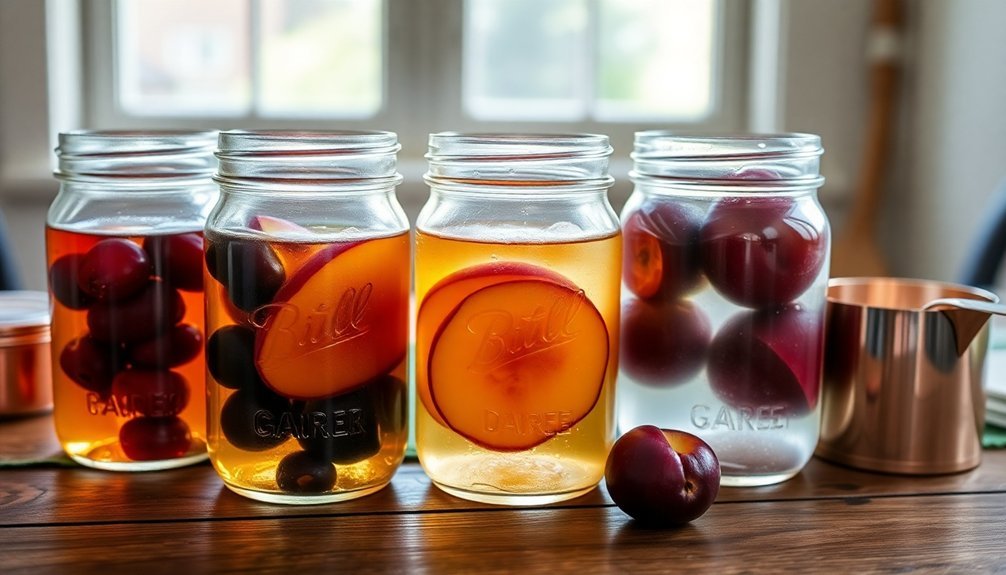
Throughout history, alcohol has proven to be one of the most effective natural preservatives for food and beverages. When you're preserving food with alcohol, you're taking advantage of ethanol's powerful antimicrobial properties that inhibit the growth of harmful bacteria, yeasts, and molds.
The preservation process works by disrupting the cell walls of these microorganisms and causing their proteins to coagulate, effectively killing them. The process typically requires three to four weeks for optimal preservation and flavor development.
You'll find that alcohol not only preserves food but also maintains its sensory qualities, including flavor, appearance, and texture. When you're using alcohol as a preservative, it's important to understand that higher alcohol content provides better preservation.
That's why spirits and high-proof liquors are particularly effective for food preservation, as they can halt fermentation processes completely.
To guarantee proper preservation, you'll need to store your alcohol-soaked foods correctly. Keep them in a cool, dark place to prevent evaporation and oxidation.
If you're using liqueurs or fortified wines in your preservation process, you might want to take into account refrigeration for ideal results. This storage method will help maintain both the preservative properties of the alcohol and the quality of your preserved foods.
Preserving Fruit in Spirits
Have you ever wondered why fruit preserved in spirits tastes so uniquely delicious? The secret lies in the infusion process, where alcohol not only preserves the fruit but also extracts and enhances its natural flavors.
To preserve fruit in spirits, you'll need fresh or frozen fruit that's been washed and patted dry. Remove any damaged pieces and pits if necessary. High-proof alcohol works best for extracting maximum flavor from the fruit.
Place the fruit in clean glass containers – vintage canning jars work perfectly. You can add spices like cinnamon, allspice, or vanilla beans for extra flavor, along with sugar to taste. Cover the fruit completely with a hard spirit like brandy, vodka, or rum (at least 80 proof).
Let your mixture steep for a minimum of 4 weeks in a cool, dark place, gently shaking the jars every few days. After the steeping period, strain the mixture through cheesecloth.
You can store both the infused spirit and the fruit in the refrigerator – they'll keep for months, though they'll begin losing color and flavor after a year.
Use your preserved fruit as dessert toppings or in baked goods, and enjoy the infused spirits in cocktails or cooking. Remember, the final product is quite potent, so serve responsibly.
Pickled Foods With Alcohol
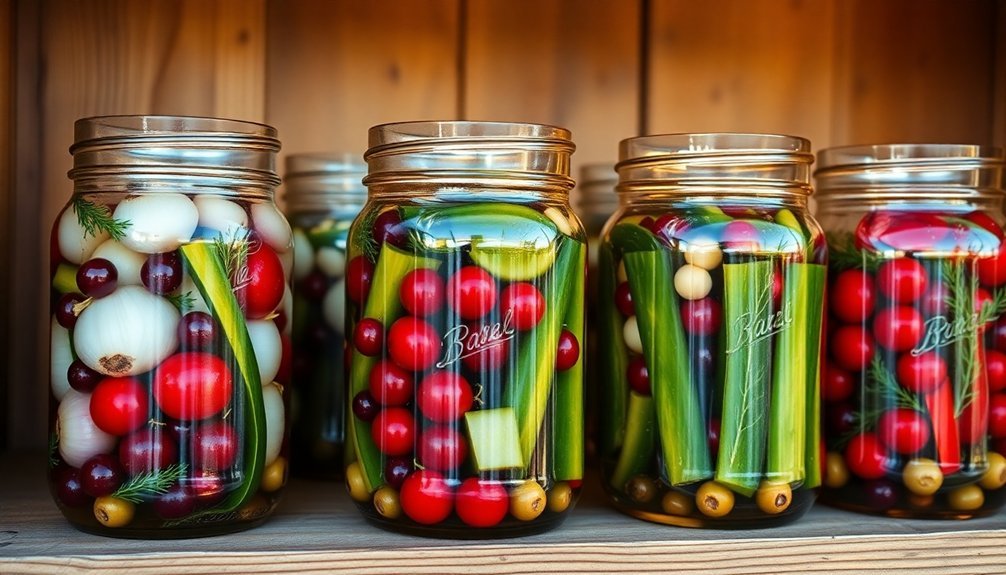
vodka-infused pickles can safely last up to three months in your refrigerator when properly submerged in their brine solution.
Apple cider vinegar can be mixed with vodka to create a more complex pickling solution for enhanced flavor profiles.
When storing bourbon-soaked fruits, you need to keep them completely covered in the alcohol mixture and stored in airtight containers to prevent spoilage.
Your alcohol-pickled foods will show clear signs if they've gone bad, including discoloration, mold growth, or off-putting odors, so check them regularly before consuming.
Vodka-Infused Pickle Storage
Properly storing vodka-infused pickles requires careful attention to temperature, light exposure, and container selection.
You'll want to keep your infusion in the refrigerator to slow down fermentation and maintain ideal flavor. If you can't refrigerate it, store it in a cool, dark place away from direct sunlight and heat sources.
Your storage container should be airtight and stored upright with the cap tightly sealed to prevent oxidation and contamination.
While vodka-infused pickles can technically last indefinitely in the fridge, you'll get the best flavor within the first few weeks. The shelf life typically ranges from six months to two years, which is shorter than regular vodka.
You'll need to monitor your infusion regularly for signs of spoilage. Watch for off-smells, discoloration, murkiness, or mold.
Always label your container with the preparation date to track its age. Remember to remove the pickles after achieving your desired flavor, as they'll become soft and lose their crunch if left too long.
For the best results, start with quality ingredients and sanitize all your equipment before making the infusion.
Bourbon-Soaked Fruit Safety
Making bourbon-soaked cherries safely requires careful attention to both preparation and storage methods. You'll need to start with fresh cherries for the best results, though you can use thawed frozen ones in a pinch.
The preservation process involves combining bourbon with brown sugar, cinnamon, and cloves, heating the mixture until the sugar dissolves.
When storing your bourbon cherries, you must keep them fully submerged in the bourbon mixture and sealed in an airtight container in your refrigerator. The alcohol content helps preserve the fruit while preventing microbial growth, but proper refrigeration is still essential.
You can expect your cherries to stay fresh for 6 to 12 months when stored correctly. Monitor your cherries regularly for any signs of spoilage, and always check the pH levels if you're uncertain about their safety.
While the texture might change slightly over time, your cherries will remain safe to eat as long as they've been properly stored. You can use them immediately in cocktails or desserts, but you'll find the flavors develop more complexity if you let them mature.
Don't forget to save the leftover bourbon syrup – it's perfect for other recipes or cocktails.
Wine Preserved Meats
Wine-preserved meats represent a time-honored tradition of curing and preserving various cuts through a combination of wine, salt, and spices. You'll find distinct storage requirements for each variety to maintain ideal quality and safety.
For vacuum-sealed products like salami and prosciutto, you can expect a shelf life of up to a year when unopened. Once you've opened these meats, they'll keep for 2-3 weeks in your refrigerator.
Spanish chorizo, when wrapped in a tea towel, maintains quality for about six months, while pancetta stays fresh for up to a year in its original packaging.
You'll discover unique varieties like Soppressata, seasoned with red wine and peppercorns, and Finocchiona, featuring fennel and wine in its preparation.
Caña de Lomo, made from acorn-fed Iberian pigs, offers a distinctive flavor profile enhanced by wine during curing.
To maximize shelf life, you'll want to focus on proper storage techniques. Keep your meats vacuum-sealed when possible, refrigerate after opening, and consider freezing for extended storage.
Remember that exposure to air greatly reduces shelf life, so always seal your meats tightly after each use.
Beer Based Marinades
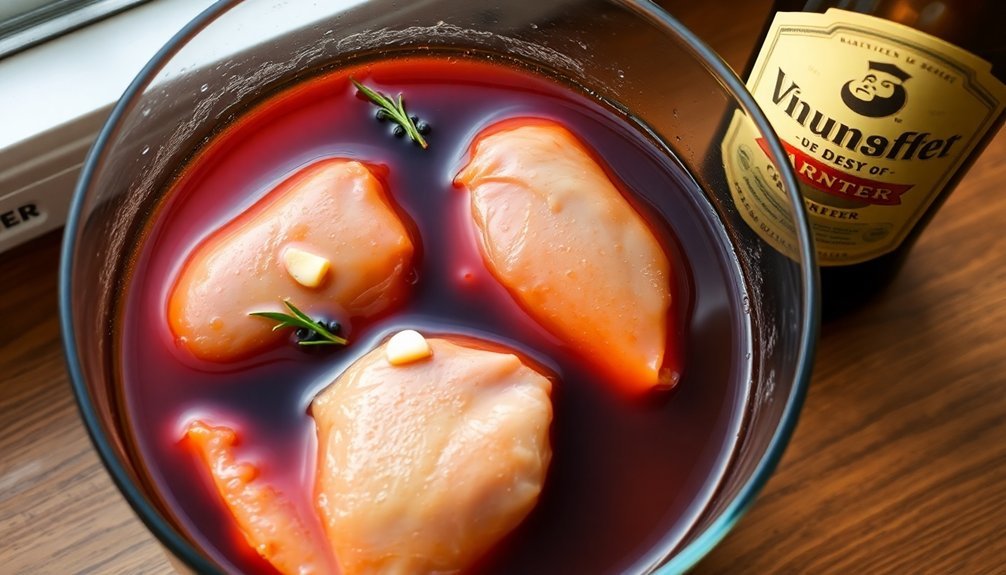
Your beer-based marinades will stay fresh for 3-4 days when refrigerated properly at 40°F or below, though you can extend their life up to 6 months by freezing them in airtight containers.
When working with beer marinades that have touched raw meat, you'll need to bring them to a rolling boil before reusing them as a sauce or baste.
For the best flavor results, you'll want to pair dark beers with robust meats like beef and pork, while lighter beers complement poultry and seafood better.
Storage Duration Guidelines
Beer-based marinades require careful attention to storage for ideal safety and flavor. You'll need to store your marinade in the refrigerator, where it can last 3-5 days. If you're planning to extend its life, you can freeze it for a couple more days, but don't expect substantial preservation benefits.
When preparing your marinade, it's essential to keep fresh chilies separate until you're ready to use them, as they'll become mushy and break down during storage. You'll want to use food-safe plastic bags or containers, making sure they're properly sealed to minimize oxygen exposure.
For transport, keep your marinade well-iced and protected from light.
Your beer choice (whether lager, ale, or stout) won't greatly impact the marinade's shelf life, but you should limit marination time to 1-2 hours for most steaks. While beer's acidity helps tenderize meat and adds sweet, nutty flavors, excessive marination can affect texture.
Remember to whisk your marinade just before use, and maintain consistent refrigeration temperatures throughout storage. When using additional ingredients like oils, garlic, or soy sauce, they'll enhance flavor but won't extend shelf life considerably.
Best Flavor Combinations
Now that you understand proper storage techniques, let's explore winning flavor combinations for beer marinades that'll elevate your dishes.
For bright, citrusy profiles, pair American wheat ale or Belgian wit with fresh lemon, lime, and orange juices, adding honey to balance the acidity. You'll want to incorporate fresh herbs like thyme and parsley for aromatic depth.
For robust, smoky flavors, combine porter ale or English stout with smoked paprika, chipotle, and brown sugar. Dark Mexican lagers work exceptionally well with cumin, chili powder, and fresh cilantro for authentic Latin-inspired marinades.
If you're aiming for Asian influences, try Helles lager with soy sauce, garlic, and ginger.
When working with light lagers, enhance their subtle maltiness by adding mustard, Worcestershire sauce, and caramelized onions.
For umami-rich combinations, incorporate fish sauce or anchovy fillets with Czech pilsner or light bock.
Don't forget to balance your marinade with olive oil or peanut oil to help the flavors meld together. You can customize heat levels by adjusting chili garlic sauce, jalapeños, or cayenne pepper to your preference.
Boozy Jams and Jellies
Creating boozy jams and jellies combines traditional fruit preserving with the sophisticated flavors of various spirits. You'll want to cook your fruit mixture first, then add the alcohol after reaching the setting point to maintain the spirits' potency. Remember to incorporate complementary ingredients like vanilla, lemon juice, and pectin for ideal texture and taste.
| Spirit Type | Fruit Pairing | Special Notes |
|---|---|---|
| Brandy | Pears, Plums | Add vanilla for depth |
| Rum | Apples, Raisins | Pulse raisins first |
| Bourbon | Berries, Peaches | Mix post-setting point |
For proper preservation, you'll need to follow strict canning protocols. Sterilize your jars and lids in boiling water, then leave appropriate headspace (1/4 to 1/2 inch) when filling. Process filled jars in a water bath canner for 10 minutes to guarantee proper sealing. If done correctly, your boozy jams will last up to a year when stored in a cool, dark place.
Keep in mind that while alcohol adds flavor, it's the sugar content that primarily prevents bacterial growth. Maintain a 1:1 sugar-to-pulp ratio for ideal preservation. Always check for signs of spoilage before consuming, especially after opening the jar.
Liquor Soaked Desserts
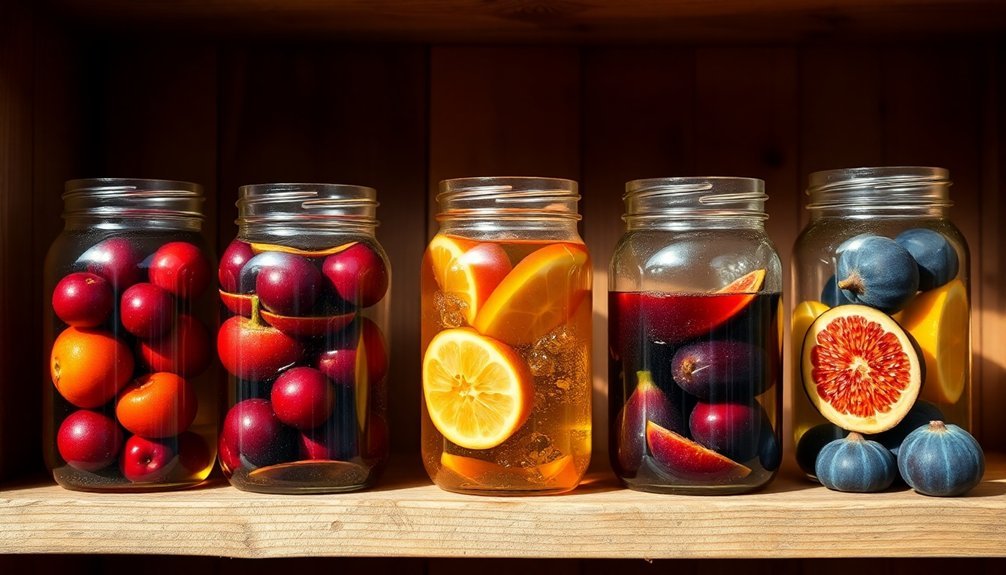
Liquor-infused desserts offer a sophisticated twist on traditional sweets while naturally extending their shelf life through alcohol's preservative properties. When you're storing these boozy treats, each type requires specific handling for best preservation.
You'll find fruitcake to be remarkably resilient, especially when regularly brushed with alcohol. Without spirits, it'll last a month on your counter, but with proper alcohol treatment, it can survive for years or even decades.
Wrap it in plastic and foil, then store it in an airtight container for best results.
For rum cakes, you'll want to keep them at room temperature rather than refrigerating them to prevent drying. An unopened rum cake lasts 5-6 months, but once you've broken the seal, consume it within two weeks.
You can freeze individual portions for longer storage.
Your homemade tiramisu needs refrigeration and will stay fresh for 1-3 days. The Marsala wine or coffee liqueur helps preserve it, and you can extend its life to three months by freezing.
Remember to thaw it in your fridge 24 hours before serving, and never refreeze it once thawed.
Storage Requirements For Preserved Foods
Proper storage techniques form the foundation of successful food preservation, whether you're working with alcohol-infused items or traditional preserves. You'll need to maintain temperatures between 40°F and 70°F for ideal results, while keeping your preserved foods away from heat sources and direct sunlight.
For alcohol-soaked foods, you'll want to use airtight containers with screw-top lids to prevent evaporation and maintain the alcohol content. Store your jars in dark closets or wrap them in paper to protect against light degradation. When you're preserving foods with liquor, always store the containers upright to maintain the integrity of the seals and prevent any cork deterioration.
Don't forget to implement the FIFO (first in, first out) method to guarantee you're using older preserves first. Label everything with dates and contents, and conduct regular inventory checks.
You'll want to plan your preservation quantities carefully – aim to preserve only what you'll use within a year. Check your preserved foods regularly for any signs of spoilage, such as discoloration or broken seals.
For the best results, maintain a cool, dry storage environment and avoid areas that experience temperature fluctuations.
Safety Considerations and Guidelines
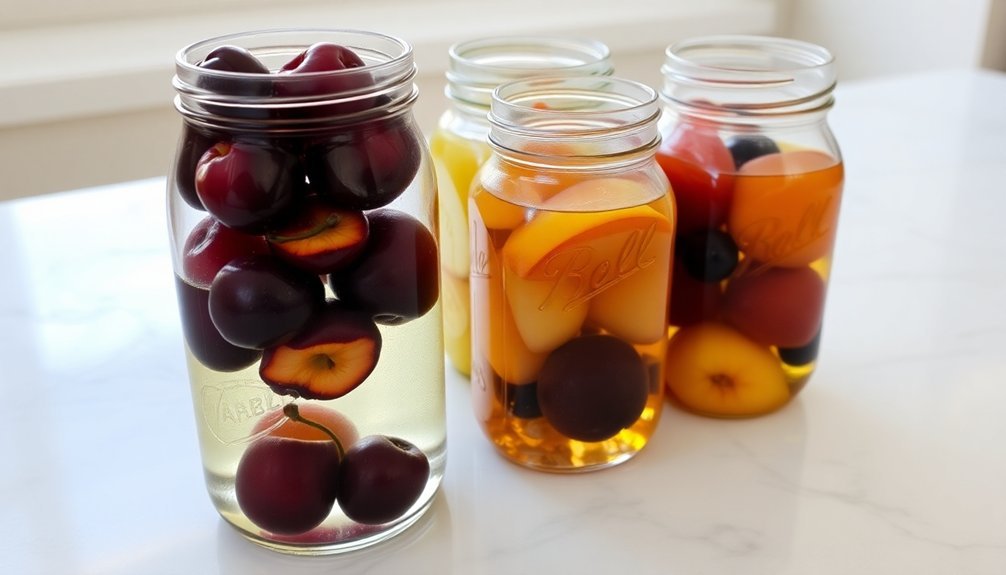
To keep alcohol-soaked foods safe, you'll need to maintain proper temperature control below 5°C and above 60°C to prevent dangerous bacterial growth, particularly Clostridium botulinum.
You must guarantee the correct ratio of alcohol to food, maintaining at least 18-21% ethanol concentration for microbiological stability.
You should also prevent cross-contamination by using clean, covered containers and keeping raw ingredients separate from prepared alcohol-soaked foods.
Proper Storage Temperature Control
Maintaining the right temperature control for alcohol-soaked foods is vital for both safety and quality preservation. You'll want to store your alcohol-infused treats in a cool, dry place with a consistent temperature between 55-60°F (13-16°C). Avoid areas with fluctuating temperatures, like kitchens or garages, as these changes can compromise both safety and flavor.
Keep your treats away from direct sunlight and excessive heat, which can increase pressure inside containers and risk leakage. While refrigeration isn't always necessary, it's important to maintain temperature stability to preserve the integrity of your alcohol-soaked foods.
| Storage Location | Temperature Range | Best For |
|---|---|---|
| Pantry | 55-60°F (13-16°C) | Fruit cakes, candies |
| Refrigerator | 34-40°F (1-4°C) | Fresh infusions, custards |
| Cool Basement | 50-65°F (10-18°C) | Preserved fruits |
| Wine Cellar | 55°F (13°C) | Long-term storage |
| Dark Cabinet | 60-65°F (15-18°C) | Short-term storage |
Remember to store your items in well-ventilated areas and use proper containers with tight seals to prevent vapor accumulation. For best results, implement secondary containment systems to catch potential spills and always keep emergency equipment nearby.
Food-Alcohol Ratio Matters
Beyond temperature control, understanding the right food-alcohol ratio plays a key role in food safety. When you're preparing dishes with alcoholic ingredients, you'll need to take into account how the alcohol interacts with other components, particularly dairy products and seafood, as these combinations can create high-risk conditions if not properly balanced.
The ratio of alcohol to food affects not just taste but safety concerns, especially in items like fruit salads, custards, and prepared salads. You'll want to be particularly careful with ready-to-eat foods containing alcohol, as these can become unsafe even when they look and smell normal.
If you're making alcohol-soaked desserts or marinades, remember that the alcohol content can affect how long you can safely store the food.
Before consuming or preparing alcohol-infused foods, you should take into account any medications you're taking or health conditions you have, as these can be affected by even small amounts of alcohol in food.
If you're pregnant, under 21, or have conditions like liver disease, you'll need to avoid these foods entirely. For others, following the standard drinking guidelines – no more than one drink daily for women and two for men – includes alcohol consumed through food.
Cross-Contamination Prevention Methods
Cross-contamination poses a serious risk when preparing alcohol-infused foods, requiring specific safety protocols to protect your dishes. You'll need to establish dedicated preparation areas and use separate equipment for alcohol-soaked ingredients to maintain food safety standards.
Always use distinct cutting boards and utensils for your alcohol preparations, and store your infused items separately from regular ingredients. Keep your workspace sanitized, and don't forget to wash your hands thoroughly before handling any ingredients or equipment.
| Safety Measure | Why It Matters | Action Required |
|---|---|---|
| Dedicated Tools | Prevents flavor transfer | Use separate utensils for alcohol prep |
| Storage Protocol | Maintains product integrity | Store infused items above non-infused |
| Surface Cleaning | Eliminates contamination risk | Sanitize before and after use |
| Personal Hygiene | Guarantees food safety | Wash hands, wear clean attire |
You'll want to implement a clear labeling system for your alcohol-infused preparations, including preparation dates and alcohol content. Store your cleaning supplies far from your food preparation area, and guarantee all equipment is properly sealed and maintained. Remember to clean and sanitize all surfaces between different alcohol infusions to prevent unwanted flavor mixing.
Best Practices For Extended Life
The shelf life of alcohol-soaked foods depends heavily on proper storage techniques and handling procedures. To maximize longevity, you'll need to store these items away from direct sunlight in a stable, room-temperature environment, using opaque or dark-colored containers to protect light-sensitive ingredients.
For peak preservation, you'll want to guarantee all containers have tight seals to minimize oxidation. When dealing with opened bottles, consider decanting into smaller containers to reduce air exposure.
If you're working with vermouth or wine-based spirits, store them in the refrigerator after opening and use them within 6-8 weeks. Track your inventory carefully and monitor opening dates. Unopened liqueurs can last 3-4 years, but once opened, you should use them within 6-12 months.
For cream-based liqueurs, refrigerate after opening and consume within 6 months. Liqueurs with less than 20% ABV need refrigeration to prevent spoilage. You can extend syrup shelf life by adding a small amount of vodka.
For citrus juices, either juice them just before use or store them in the fridge for up to 3-4 weeks to maintain freshness.
Common Issues and Solutions
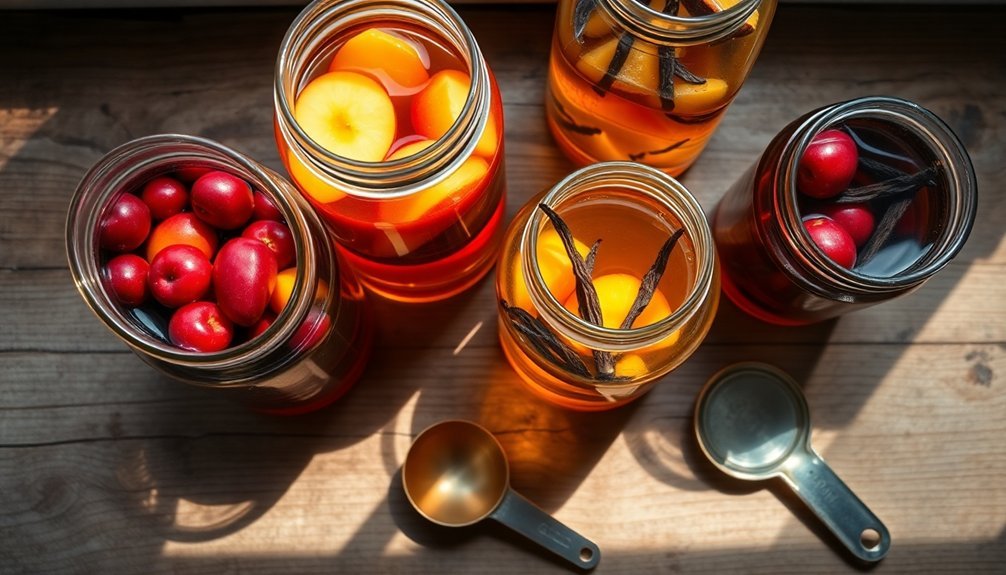
Several critical issues emerge when working with alcohol-soaked foods, ranging from health concerns to legal implications.
You'll need to be mindful of potential nutrient absorption problems, especially when combining wine-soaked foods with iron-rich ingredients. The tannins in wine can interfere with your body's ability to absorb essential nutrients.
Digestive issues often arise when you combine certain alcohol-infused foods, such as beer-based dishes with bread products, due to their high yeast content. If you're prone to acid reflux or GERD, avoid pairing acidic foods like marinara sauce with alcohol-based recipes.
You'll also want to watch out for chocolate or caffeine combinations, as they can worsen gastric problems.
Be aware that cooking methods considerably impact alcohol retention. Quick-cooking techniques can leave up to 85% of the alcohol content intact, potentially leading to legal impairment if you're driving.
To minimize these risks, use longer cooking times and lower-proof alcohols when possible. If you're serving these dishes, always inform your guests about the alcohol content and consider providing alcohol-free alternatives, especially for recovering alcoholics or designated drivers.
Frequently Asked Questions
Can I Get Drunk From Eating Alcohol-Preserved Foods?
You won't get drunk from alcohol-preserved foods since they contain minimal alcohol content that your body quickly metabolizes. Even foods soaked in liquor don't pack enough alcohol to cause intoxication.
Does the Alcohol Content in Preserved Foods Decrease Over Time?
Yes, you'll notice the alcohol content in preserved foods gradually decreases over time. Even sealed containers experience slow evaporation, though the rate depends on storage conditions and the initial alcohol concentration.
Are There Religious Restrictions for Consuming Foods Preserved With Alcohol?
Yes, if you follow certain religions, you'll need to avoid alcohol-preserved foods. Islamic law strictly prohibits them, while Jewish law requires kosher preparation. Jainism forbids them, and some other faiths have varying restrictions.
Can Children Safely Eat Foods Preserved With Alcohol?
You shouldn't feed children foods preserved with alcohol. Even small amounts can be harmful due to their smaller body size. It's best to choose alcohol-free alternatives to protect their health and development.
Does the Type of Alcohol Used Affect the Nutritional Value?
You'll find that different alcohols have minimal impact on nutrition since they all provide empty calories. The main nutritional differences come from added ingredients like sugars and mixers, not the alcohol itself.
In Summary
You've now learned how alcohol preservation can greatly extend your food's shelf life when done correctly. Whether you're soaking fruits in spirits, pickling with wine, or marinating with beer, remember to follow proper safety guidelines and storage requirements. Keep monitoring your preserved foods for quality, and don't hesitate to discard anything suspicious. With these techniques, you'll enjoy your alcohol-preserved foods safely for months to come.
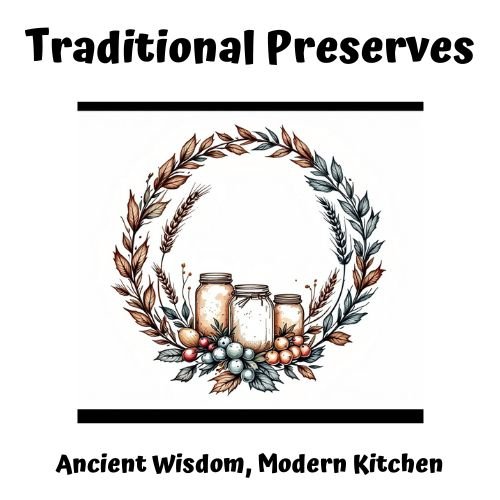
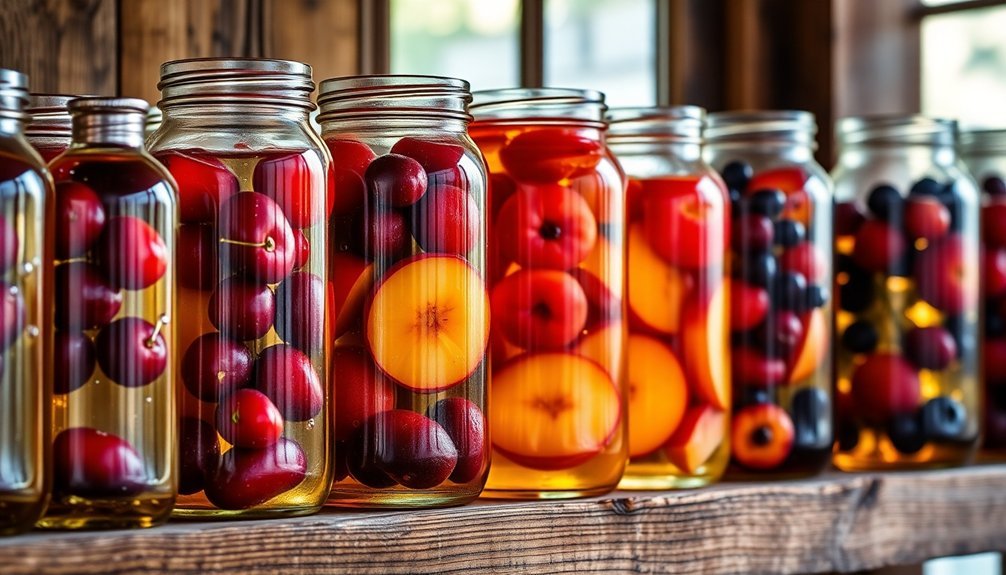
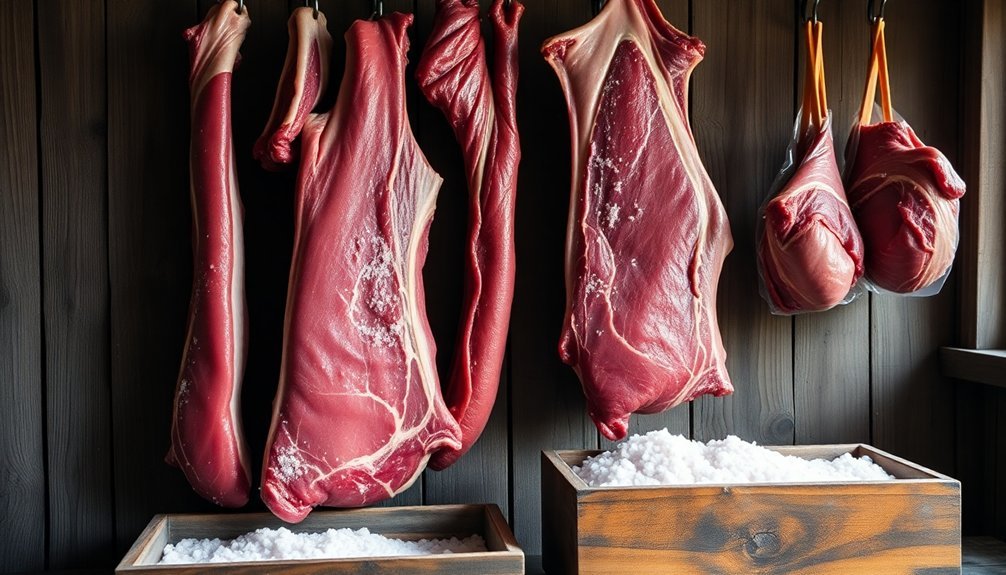
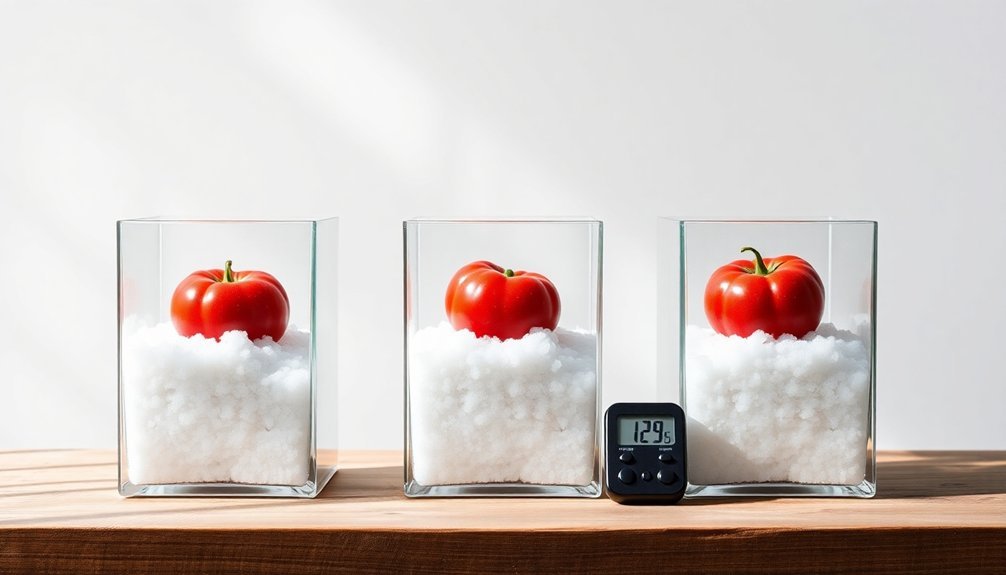
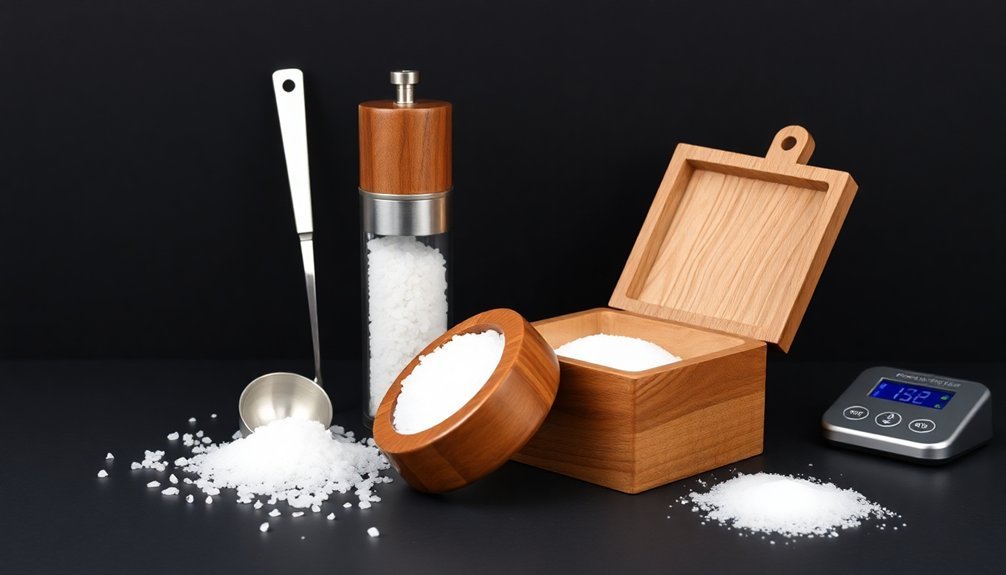
Leave a Reply